The PR fixes the interface of `EventReader::clear`. Currently, the method consumes the reader, which makes it unusable.
## Changelog
- `EventReader::clear` now takes a mutable reference instead of consuming the event reader.
## Migration Guide
`EventReader::clear` now takes a mutable reference instead of consuming the event reader. This means that `clear` now needs explicit mutable access to the reader variable, which previously could have been omitted in some cases:
```rust
// Old (0.9)
fn clear_events(reader: EventReader<SomeEvent>) {
reader.clear();
}
// New (0.10)
fn clear_events(mut reader: EventReader<SomeEvent>) {
reader.clear();
}
```
Co-authored-by: Carter Anderson <mcanders1@gmail.com>
# Objective
The global_vs_local_translation example tries to use transparency to identify static cubes, but the materials of those cubes aren't transparent.
## Solution
Change material alpha_mode to `AlphaMode::Blend` for those cubes.
# Objective
- Every usage of `DrawFunctionsInternals::get_id()` was followed by a `.unwrap()`. which just adds boilerplate.
## Solution
- Introduce a fallible version of `DrawFunctionsInternals::get_id()` and use it where possible.
- I also took the opportunity to improve the error message a little in the case where it fails.
---
## Changelog
- Added `DrawFunctionsInternals::id()`
# Objective
- Fix CI issue with updated `cargo-app`
## Solution
- Move the Android example to its own package. It's not necessary for the CI fix, but it's cleaner, mimic the iOS example, and easier to reuse for someone wanting to setup android support in their project
- Build the package in CI instead of the example
The Android example is still working on my android device with this change 👍
# Objective
- shaders defs can now have a `bool` or `int` value
- `#if SHADER_DEF <operator> 3`
- ok if `SHADER_DEF` is defined, has the correct type and pass the comparison
- `==`, `!=`, `>=`, `>`, `<`, `<=` supported
- `#SHADER_DEF` or `#{SHADER_DEF}`
- will be replaced by the value in the shader code
---
## Migration Guide
- replace `shader_defs.push(String::from("NAME"));` by `shader_defs.push("NAME".into());`
- if you used shader def `NO_STORAGE_BUFFERS_SUPPORT`, check how `AVAILABLE_STORAGE_BUFFER_BINDINGS` is now used in Bevy default shaders
# Objective
`add_node_edge` and `add_slot_edge` are fallible methods, but are always used with `.unwrap()`.
`input_node` is often unwrapped as well.
This points to having an infallible behaviour as default, with an alternative fallible variant if needed.
Improves readability and ergonomics.
## Solution
- Change `add_node_edge` and `add_slot_edge` to panic on error.
- Change `input_node` to panic on `None`.
- Add `try_add_node_edge` and `try_add_slot_edge` in case fallible methods are needed.
- Add `get_input_node` to still be able to get an `Option`.
---
## Changelog
### Added
- `try_add_node_edge`
- `try_add_slot_edge`
- `get_input_node`
### Changed
- `add_node_edge` is now infallible (panics on error)
- `add_slot_edge` is now infallible (panics on error)
- `input_node` now panics on `None`
## Migration Guide
Remove `.unwrap()` from `add_node_edge` and `add_slot_edge`.
For cases where the error was handled, use `try_add_node_edge` and `try_add_slot_edge` instead.
Remove `.unwrap()` from `input_node`.
For cases where the option was handled, use `get_input_node` instead.
Co-authored-by: Torstein Grindvik <52322338+torsteingrindvik@users.noreply.github.com>
# Objective
Fixes#6498.
## Solution
Adding a parent node with properties AlignItems::Center and JustifyContent::Center to centered child nodes and removing their auto-margin properties.
# Objective
Allow more use cases where the user may benefit from both `ExtractComponentPlugin` _and_ `UniformComponentPlugin`.
## Solution
Add an associated type to `ExtractComponent` in order to allow specifying the output component (or bundle).
Make `extract_component` return an `Option<_>` such that components can be extracted only when needed.
What problem does this solve?
`ExtractComponentPlugin` allows extracting components, but currently the output type is the same as the input.
This means that use cases such as having a settings struct which turns into a uniform is awkward.
For example we might have:
```rust
struct MyStruct {
enabled: bool,
val: f32
}
struct MyStructUniform {
val: f32
}
```
With the new approach, we can extract `MyStruct` only when it is enabled, and turn it into its related uniform.
This chains well with `UniformComponentPlugin`.
The user may then:
```rust
app.add_plugin(ExtractComponentPlugin::<MyStruct>::default());
app.add_plugin(UniformComponentPlugin::<MyStructUniform>::default());
```
This then saves the user a fair amount of boilerplate.
## Changelog
### Changed
- `ExtractComponent` can specify output type, and outputting is optional.
Co-authored-by: Torstein Grindvik <52322338+torsteingrindvik@users.noreply.github.com>
# Objective
- Bevy should be usable to create 'overlay' type apps, where the input is not captured by Bevy, but passed down/into a target app, or to allow passive displays/widgets etc.
## Solution
- the `winit:🪟:Window` already has a `set_cursor_hittest()` which basically does this for mouse input events, so I've exposed it (trying to copy the style laid out in the existing wrappings, and added a simple demo.
---
## Changelog
- Added `hittest` to `WindowAttributes`
- Added the `hittest`'s setters/getters
- Modified the `WindowBuilder`
- Modifed the `WindowDescriptor`'s `Default` impl.
- Added an example `cargo run --example fallthrough`
# Objective
- The `contributors` example panics when attempting to generate an empty range if the window height is smaller than the sprites
- Don't do that
## Solution
- Clamp the bounce height to be 0 minimum, and generate an inclusive range when passing it to `rng.gen_range`
# Objective
I needed a window which is always on top, to create a overlay app.
## Solution
expose the `always_on_top` property of winit in bevy's `WindowDescriptor` as a boolean flag
---
## Changelog
### Added
- add `WindowDescriptor.always_on_top` which configures a window to stay on top.
# Objective
Fixes #3225, Allow for flippable UI Images
## Solution
Add flip_x and flip_y fields to UiImage, and swap the UV coordinates accordingly in ui_prepare_nodes.
## Changelog
* Changes UiImage to a struct with texture, flip_x, and flip_y fields.
* Adds flip_x and flip_y fields to ExtractedUiNode.
* Changes extract_uinodes to extract the flip_x and flip_y values from UiImage.
* Changes prepare_uinodes to swap the UV coordinates as required.
* Changes UiImage derefs to texture field accesses.
# Objective
- Using the instancing example as reference, I found it was breaking when enabling HDR on the camera. I found that this was because, unlike in internal code, this was not updating the specialization key with `view.hdr`.
## Solution
- Add the missing HDR bit.
# Objective
- Fix an awkwardly phrased/typoed error message
- Actually tell users which file caused the error
- IMO we don't need to panic
## Solution
- Add a warning including the involved asset path when a non-image is found by `load_folder`
- Note: uses `let else` which is stable now
```
2022-11-03T14:17:59.006861Z WARN texture_atlas: Some(AssetPath { path: "textures/rpg/tiles/whatisthisdoinghere.ogg", label: None }) did not resolve to an `Image` asset.
```
# Objective
Fixes: https://github.com/bevyengine/bevy/issues/6466
Summary: The UI Scaling example dynamically scales the UI which will dynamically allocate fonts to the font atlas surpassing the protective limit, throwing a panic.
## Solution
- Set TextSettings.allow_dynamic_font_size = true for the UI Scaling example. This is the ideal solution since the dynamic changes to the UI are not continuous yet still discrete.
- Update the panic text to reflect ui scaling as a potential cause
# Objective
The bloom example has a 2d camera for the UI. This is an artifact of an older version of bevy. All cameras can render the UI now.
## Solution
Remove the 2d camera
Allow passing `Vec`s of glam vector types as vertex attributes.
Alternative to #4548 and #2719
Also used some macros to cut down on all the repetition.
# Migration Guide
Implementations of `From<Vec<[u16; 4]>>` and `From<Vec<[u8; 4]>>` for `VertexAttributeValues` have been removed.
I you're passing either `Vec<[u16; 4]>` or `Vec<[u8; 4]>` into `Mesh::insert_attribute` it will now require wrapping it with right the `VertexAttributeValues` enum variant.
Co-authored-by: devil-ira <justthecooldude@gmail.com>
# Objective
- Adds a bloom pass for HDR-enabled Camera3ds.
- Supersedes (and all credit due to!) https://github.com/bevyengine/bevy/pull/3430 and https://github.com/bevyengine/bevy/pull/2876
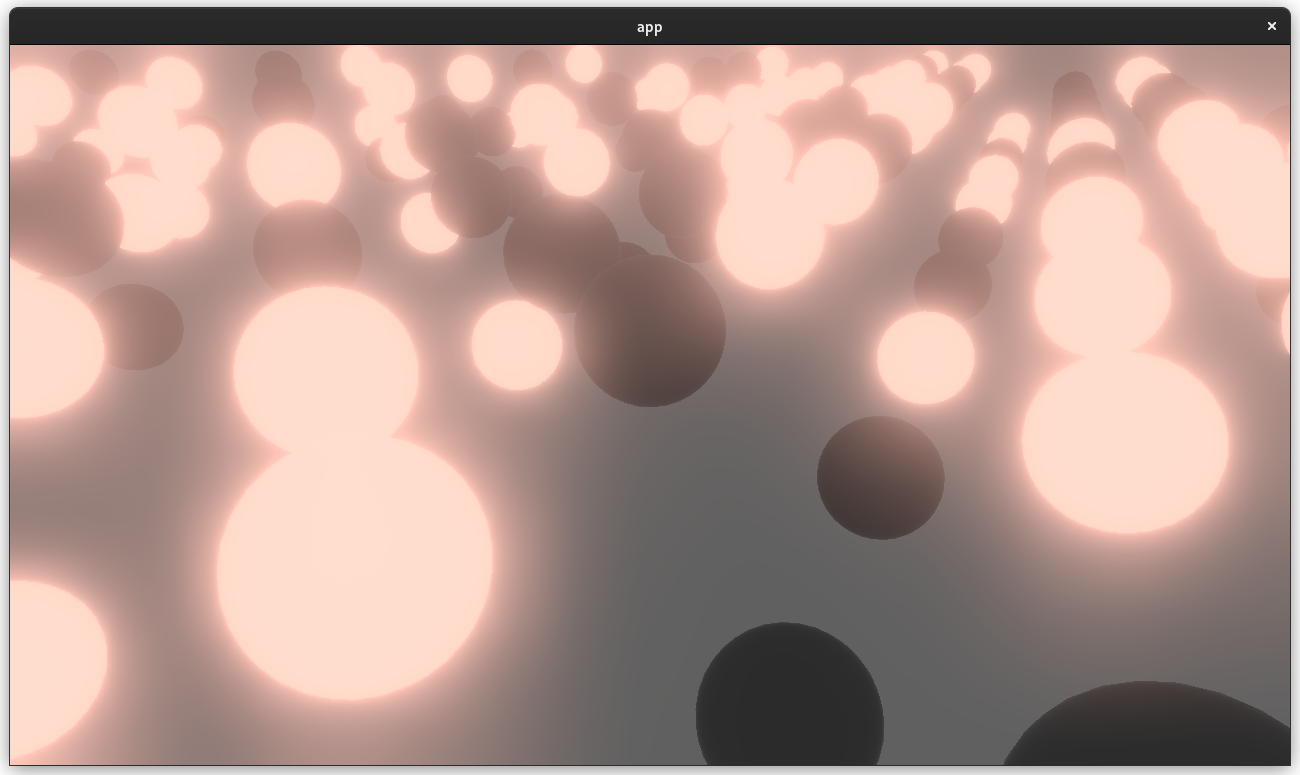
## Solution
- A threshold is applied to isolate emissive samples, and then a series of downscale and upscaling passes are applied and composited together.
- Bloom is applied to 2d or 3d Cameras with hdr: true and a BloomSettings component.
---
## Changelog
- Added a `core_pipeline::bloom::BloomSettings` component.
- Added `BloomNode` that runs between the main pass and tonemapping.
- Added a `BloomPlugin` that is loaded as part of CorePipelinePlugin.
- Added a bloom example project.
Co-authored-by: JMS55 <47158642+JMS55@users.noreply.github.com>
Co-authored-by: Carter Anderson <mcanders1@gmail.com>
Co-authored-by: DGriffin91 <github@dgdigital.net>
# Objective
Replace `WorldQueryGats` trait with actual gats
## Solution
Replace `WorldQueryGats` trait with actual gats
---
## Changelog
- Replaced `WorldQueryGats` trait with actual gats
## Migration Guide
- Replace usage of `WorldQueryGats` assoc types with the actual gats on `WorldQuery` trait
# Objective
Add consistent UI rendering and interaction where deep nodes inside two different hierarchies will never render on top of one-another by default and offer an escape hatch (z-index) for nodes to change their depth.
## The problem with current implementation
The current implementation of UI rendering is broken in that regard, mainly because [it sets the Z value of the `Transform` component based on a "global Z" space](https://github.com/bevyengine/bevy/blob/main/crates/bevy_ui/src/update.rs#L43) shared by all nodes in the UI. This doesn't account for the fact that each node's final `GlobalTransform` value will be relative to its parent. This effectively makes the depth unpredictable when two deep trees are rendered on top of one-another.
At the moment, it's also up to each part of the UI code to sort all of the UI nodes. The solution that's offered here does the full sorting of UI node entities once and offers the result through a resource so that all systems can use it.
## Solution
### New ZIndex component
This adds a new optional `ZIndex` enum component for nodes which offers two mechanism:
- `ZIndex::Local(i32)`: Overrides the depth of the node relative to its siblings.
- `ZIndex::Global(i32)`: Overrides the depth of the node relative to the UI root. This basically allows any node in the tree to "escape" the parent and be ordered relative to the entire UI.
Note that in the current implementation, omitting `ZIndex` on a node has the same result as adding `ZIndex::Local(0)`. Additionally, the "global" stacking context is essentially a way to add your node to the root stacking context, so using `ZIndex::Local(n)` on a root node (one without parent) will share that space with all nodes using `Index::Global(n)`.
### New UiStack resource
This adds a new `UiStack` resource which is calculated from both hierarchy and `ZIndex` during UI update and contains a vector of all node entities in the UI, ordered by depth (from farthest from camera to closest). This is exposed publicly by the bevy_ui crate with the hope that it can be used for consistent ordering and to reduce the amount of sorting that needs to be done by UI systems (i.e. instead of sorting everything by `global_transform.z` in every system, this array can be iterated over).
### New z_index example
This also adds a new z_index example that showcases the new `ZIndex` component. It's also a good general demo of the new UI stack system, because making this kind of UI was very broken with the old system (e.g. nodes would render on top of each other, not respecting hierarchy or insert order at all).
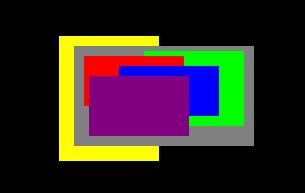
---
## Changelog
- Added the `ZIndex` component to bevy_ui.
- Added the `UiStack` resource to bevy_ui, and added implementation in a new `stack.rs` module.
- Removed the previous Z updating system from bevy_ui, because it was replaced with the above.
- Changed bevy_ui rendering to use UiStack instead of z ordering.
- Changed bevy_ui focus/interaction system to use UiStack instead of z ordering.
- Added a new z_index example.
## ZIndex demo
Here's a demo I wrote to test these features
https://user-images.githubusercontent.com/1060971/188329295-d7beebd6-9aee-43ab-821e-d437df5dbe8a.mp4
Co-authored-by: Carter Anderson <mcanders1@gmail.com>
# Objective
Fixes#6059, changing all incorrect occurrences of ``id`` in the ``entity`` module to ``index``:
* struct level documentation,
* ``id`` struct field,
* ``id`` method and its documentation.
## Solution
Renaming and verifying using CI.
Co-authored-by: Edvin Kjell <43633999+Edwox@users.noreply.github.com>
# Objective
- Add post processing passes for FXAA (Fast Approximate Anti-Aliasing)
- Add example comparing MSAA and FXAA
## Solution
When the FXAA plugin is added, passes for FXAA are inserted between the main pass and the tonemapping pass. Supports using either HDR or LDR output from the main pass.
---
## Changelog
- Add a new FXAANode that runs after the main pass when the FXAA plugin is added.
Co-authored-by: Carter Anderson <mcanders1@gmail.com>
# Objective
- Fixes #6311
- Make it clearer what should be done in the example (close the Bevy app window)
## Solution
- Remove the second windowed Bevy App [since winit does not support this](https://github.com/rust-windowing/winit/blob/v0.27.4/src/event_loop.rs#L82-L83)
- Add title to the Bevy window asking the user to close it
This is more of a quick fix to have a working example. It would be nicer if we had a small real usecase for this functionality.
Another alternativ that I tried out: If we want to showcase a second Bevy app as it was before, we could still do this as long as one of them does not have a window. But I don't see how this is helpful in the context of the example, so I stuck with only one Bevy app and a simple print afterwards.
# Objective
- Make it impossible to add a plugin twice
- This is going to be more a risk for plugins with configurations, to avoid things like `App::new().add_plugins(DefaultPlugins).add_plugin(ImagePlugin::default_nearest())`
## Solution
- Panic when a plugin is added twice
- It's still possible to mark a plugin as not unique by overriding `is_unique`
- ~~Simpler version of~~ #3988 (not simpler anymore because of how `PluginGroupBuilder` implements `PluginGroup`)
# Objective
Currently toggling an `AudioSink` (for example from a game menu) requires writing
```rs
if sink.is_paused() {
sink.play();
} else {
sink.pause();
}
```
It would be nicer if we could reduce this down to a single line
```rs
sink.toggle();
```
## Solution
Add an `AudioSink::toggle` method which does exactly that.
---
## Changelog
- Added `AudioSink::toggle` which can be used to toggle state of a sink.
# Objective
Add methods to `Query<&Children>` and `Query<&Parent>` to iterate over descendants and ancestors, respectively.
## Changelog
* Added extension trait for `Query` in `bevy_hierarchy`, `HierarchyQueryExt`
* Added method `iter_descendants` to `Query<&Children>` via `HierarchyQueryExt` for iterating over the descendants of an entity.
* Added method `iter_ancestors` to `Query<&Parent>` via `HierarchyQueryExt` for iterating over the ancestors of an entity.
Co-authored-by: devil-ira <justthecooldude@gmail.com>
# Objective
Bevy still has many instances of using single-tuples `(T,)` to create a bundle. Due to #2975, this is no longer necessary.
## Solution
Search for regex `\(.+\s*,\)`. This should have found every instance.
# Objective
Following discussion on #3536 and #3522, `Handle::as_weak()` takes a type `U`, reinterpreting the handle as of another asset type while keeping the same ID. This is mainly used today in font atlas code. This PR does two things:
- Rename the method to `cast_weak()` to make its intent more clear
- Actually change the type uuid in the handle if it's not an asset path variant.
## Migration Guide
- Rename `Handle::as_weak` uses to `Handle::cast_weak`
The method now properly sets the associated type uuid if the handle is a direct reference (e.g. not a reference to an `AssetPath`), so adjust you code accordingly if you relied on the previous behavior.
# Objective
- fix new clippy lints before they get stable and break CI
## Solution
- run `clippy --fix` to auto-fix machine-applicable lints
- silence `clippy::should_implement_trait` for `fn HandleId::default<T: Asset>`
## Changes
- always prefer `format!("{inline}")` over `format!("{}", not_inline)`
- prefer `Box::default` (or `Box::<T>::default` if necessary) over `Box::new(T::default())`
Attempt to make features like bloom https://github.com/bevyengine/bevy/pull/2876 easier to implement.
**This PR:**
- Moves the tonemapping from `pbr.wgsl` into a separate pass
- also add a separate upscaling pass after the tonemapping which writes to the swap chain (enables resolution-independant rendering and post-processing after tonemapping)
- adds a `hdr` bool to the camera which controls whether the pbr and sprite shaders render into a `Rgba16Float` texture
**Open questions:**
- ~should the 2d graph work the same as the 3d one?~ it is the same now
- ~The current solution is a bit inflexible because while you can add a post processing pass that writes to e.g. the `hdr_texture`, you can't write to a separate `user_postprocess_texture` while reading the `hdr_texture` and tell the tone mapping pass to read from the `user_postprocess_texture` instead. If the tonemapping and upscaling render graph nodes were to take in a `TextureView` instead of the view entity this would almost work, but the bind groups for their respective input textures are already created in the `Queue` render stage in the hardcoded order.~ solved by creating bind groups in render node
**New render graph:**
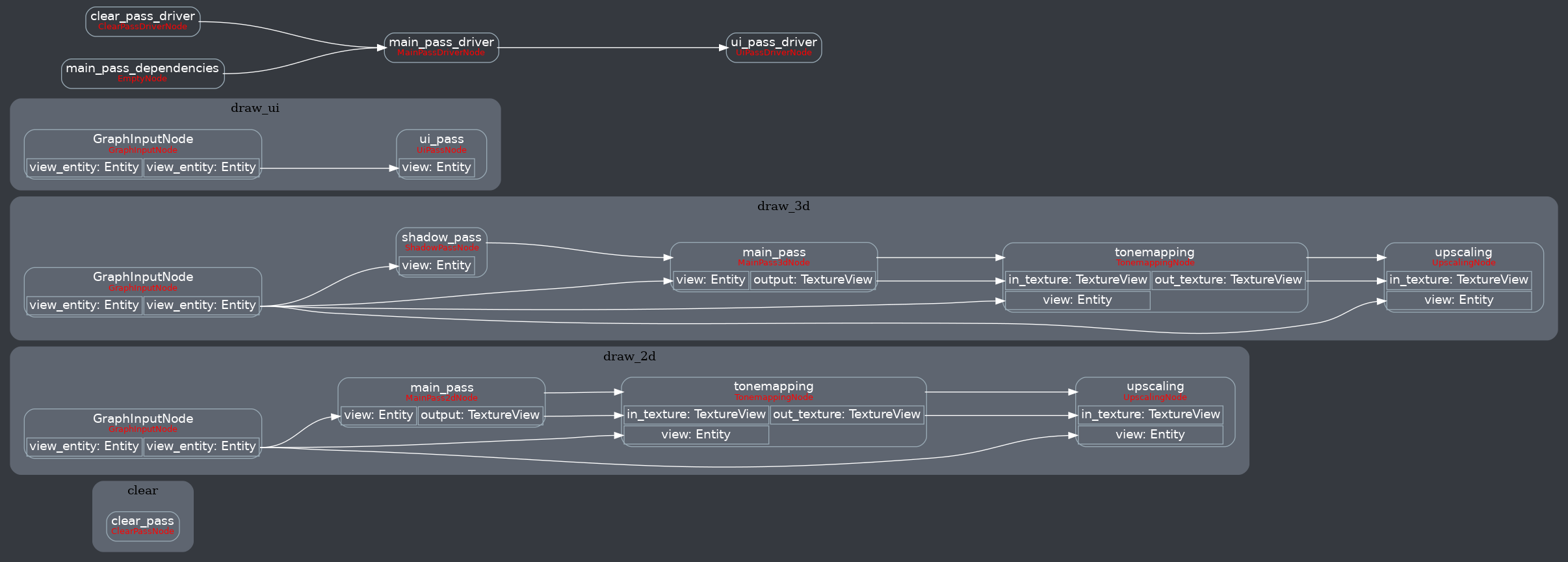
<details>
<summary>Before</summary>
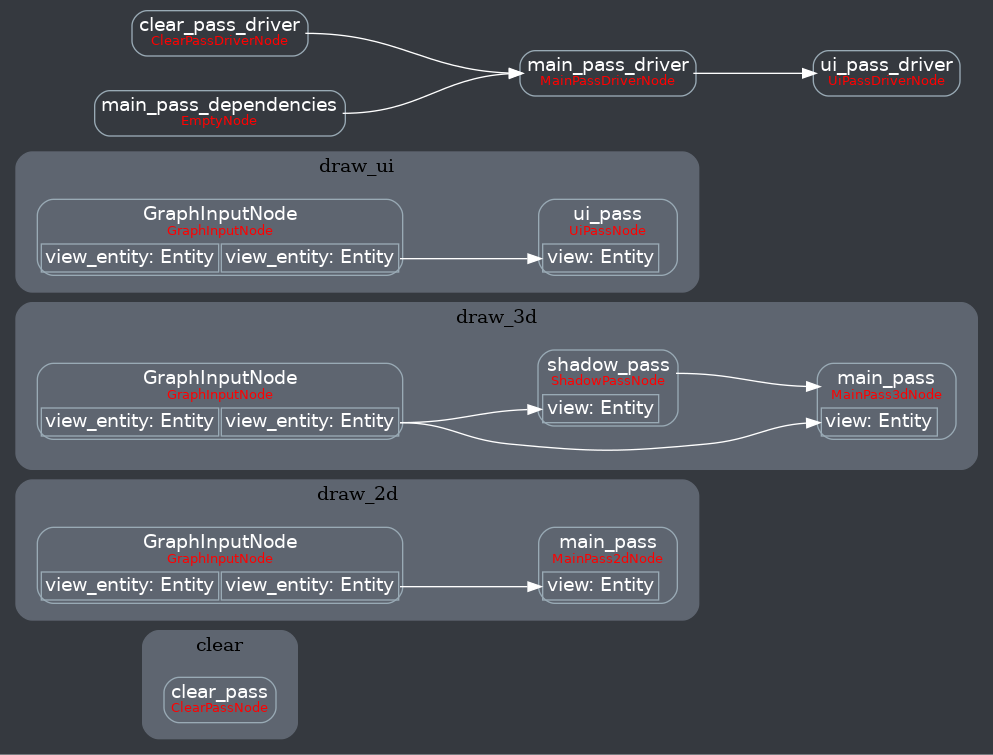
</details>
Co-authored-by: Carter Anderson <mcanders1@gmail.com>
# Objective
- Proactive changing of code to comply with warnings generated by beta of rustlang version of cargo clippy.
## Solution
- Code changed as recommended by `rustup update`, `rustup default beta`, `cargo run -p ci -- clippy`.
- Tested using `beta` and `stable`. No clippy warnings in either after changes made.
---
## Changelog
- Warnings fixed were: `clippy::explicit-auto-deref` (present in 11 files), `clippy::needless-borrow` (present in 2 files), and `clippy::only-used-in-recursion` (only 1 file).
# Objective
- Build on #6336 for more plugin configurations
## Solution
- `LogSettings`, `ImageSettings` and `DefaultTaskPoolOptions` are now plugins settings rather than resources
---
## Changelog
- `LogSettings` plugin settings have been move to `LogPlugin`, `ImageSettings` to `ImagePlugin` and `DefaultTaskPoolOptions` to `CorePlugin`
## Migration Guide
The `LogSettings` settings have been moved from a resource to `LogPlugin` configuration:
```rust
// Old (Bevy 0.8)
app
.insert_resource(LogSettings {
level: Level::DEBUG,
filter: "wgpu=error,bevy_render=info,bevy_ecs=trace".to_string(),
})
.add_plugins(DefaultPlugins)
// New (Bevy 0.9)
app.add_plugins(DefaultPlugins.set(LogPlugin {
level: Level::DEBUG,
filter: "wgpu=error,bevy_render=info,bevy_ecs=trace".to_string(),
}))
```
The `ImageSettings` settings have been moved from a resource to `ImagePlugin` configuration:
```rust
// Old (Bevy 0.8)
app
.insert_resource(ImageSettings::default_nearest())
.add_plugins(DefaultPlugins)
// New (Bevy 0.9)
app.add_plugins(DefaultPlugins.set(ImagePlugin::default_nearest()))
```
The `DefaultTaskPoolOptions` settings have been moved from a resource to `CorePlugin::task_pool_options`:
```rust
// Old (Bevy 0.8)
app
.insert_resource(DefaultTaskPoolOptions::with_num_threads(4))
.add_plugins(DefaultPlugins)
// New (Bevy 0.9)
app.add_plugins(DefaultPlugins.set(CorePlugin {
task_pool_options: TaskPoolOptions::with_num_threads(4),
}))
```
# Objective
Fixes#5884#2879
Alternative to #2988#5885#2886
"Immutable" Plugin settings are currently represented as normal ECS resources, which are read as part of plugin init. This presents a number of problems:
1. If a user inserts the plugin settings resource after the plugin is initialized, it will be silently ignored (and use the defaults instead)
2. Users can modify the plugin settings resource after the plugin has been initialized. This creates a false sense of control over settings that can no longer be changed.
(1) and (2) are especially problematic and confusing for the `WindowDescriptor` resource, but this is a general problem.
## Solution
Immutable Plugin settings now live on each Plugin struct (ex: `WindowPlugin`). PluginGroups have been reworked to support overriding plugin values. This also removes the need for the `add_plugins_with` api, as the `add_plugins` api can use the builder pattern directly. Settings that can be used at runtime continue to be represented as ECS resources.
Plugins are now configured like this:
```rust
app.add_plugin(AssetPlugin {
watch_for_changes: true,
..default()
})
```
PluginGroups are now configured like this:
```rust
app.add_plugins(DefaultPlugins
.set(AssetPlugin {
watch_for_changes: true,
..default()
})
)
```
This is an alternative to #2988, which is similar. But I personally prefer this solution for a couple of reasons:
* ~~#2988 doesn't solve (1)~~ #2988 does solve (1) and will panic in that case. I was wrong!
* This PR directly ties plugin settings to Plugin types in a 1:1 relationship, rather than a loose "setup resource" <-> plugin coupling (where the setup resource is consumed by the first plugin that uses it).
* I'm not a huge fan of overloading the ECS resource concept and implementation for something that has very different use cases and constraints.
## Changelog
- PluginGroups can now be configured directly using the builder pattern. Individual plugin values can be overridden by using `plugin_group.set(SomePlugin {})`, which enables overriding default plugin values.
- `WindowDescriptor` plugin settings have been moved to `WindowPlugin` and `AssetServerSettings` have been moved to `AssetPlugin`
- `app.add_plugins_with` has been replaced by using `add_plugins` with the builder pattern.
## Migration Guide
The `WindowDescriptor` settings have been moved from a resource to `WindowPlugin::window`:
```rust
// Old (Bevy 0.8)
app
.insert_resource(WindowDescriptor {
width: 400.0,
..default()
})
.add_plugins(DefaultPlugins)
// New (Bevy 0.9)
app.add_plugins(DefaultPlugins.set(WindowPlugin {
window: WindowDescriptor {
width: 400.0,
..default()
},
..default()
}))
```
The `AssetServerSettings` resource has been removed in favor of direct `AssetPlugin` configuration:
```rust
// Old (Bevy 0.8)
app
.insert_resource(AssetServerSettings {
watch_for_changes: true,
..default()
})
.add_plugins(DefaultPlugins)
// New (Bevy 0.9)
app.add_plugins(DefaultPlugins.set(AssetPlugin {
watch_for_changes: true,
..default()
}))
```
`add_plugins_with` has been replaced by `add_plugins` in combination with the builder pattern:
```rust
// Old (Bevy 0.8)
app.add_plugins_with(DefaultPlugins, |group| group.disable::<AssetPlugin>());
// New (Bevy 0.9)
app.add_plugins(DefaultPlugins.build().disable::<AssetPlugin>());
```
# Objective
Fixes#6339.
## Solution
This PR adds a new type, `GamepadInfo`, which holds metadata associated with a particular `Gamepad`. The `Gamepads` resource now holds a `HashMap<Gamepad, GamepadInfo>`. The `GamepadInfo` is created when the gamepad backend (by default `bevy_gilrs`) emits a "gamepad connected" event.
The `gamepad_viewer` example has been updated to showcase the new functionality.
Before:
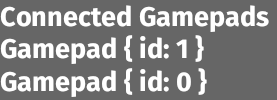
After:

---
## Changelog
### Added
- Added `GamepadInfo`.
- Added `Gamepads::name()`, which returns the name of the specified gamepad if it exists.
### Changed
- `GamepadEventType::Connected` is now a tuple variant with a single field of type `GamepadInfo`.
- Since `GamepadInfo` is not `Copy`, `GamepadEventType` is no longer `Copy`. The same is true of `GamepadEvent` and `GamepadEventRaw`.
## Migration Guide
- Pattern matches on `GamepadEventType::Connected` will need to be updated, as the form of the variant has changed.
- Code that requires `GamepadEvent`, `GamepadEventRaw` or `GamepadEventType` to be `Copy` will need to be updated.
# Objective
- Add Time-Adjusted Rolling EMA-based smoothing to diagnostics.
- Closes#4983; see that issue for more more information.
## Terms
- EMA - [Exponential Moving Average](https://en.wikipedia.org/wiki/Moving_average#Exponential_moving_average)
- SMA - [Simple Moving Average](https://en.wikipedia.org/wiki/Moving_average#Simple_moving_average)
## Solution
- We use a fairly standard approximation of a true EMA where $EMA_{\text{frame}} = EMA_{\text{previous}} + \alpha \left( x_{\text{frame}} - EMA_{\text{previous}} \right)$ where $\alpha = \Delta t / \tau$ and $\tau$ is an arbitrary smoothness factor. (See #4983 for more discussion of the math.)
- The smoothness factor is here defaulted to $2 / 21$; this was chosen fairly arbitrarily as supposedly related to the existing 20-bucket SMA.
- The smoothness factor can be set on a per-diagnostic basis via `Diagnostic::with_smoothing_factor`.
---
## Changelog
### Added
- `Diagnostic::smoothed` - provides an exponentially smoothed view of a recorded diagnostic, to e.g. reduce jitter in frametime readings.
### Changed
- `LogDiagnosticsPlugin` now records the smoothed value rather than the raw value.
- For diagnostics recorded less often than every 0.1 seconds, this change to defaults will have no visible effect.
- For discrete diagnostics where this smoothing is not desirable, set a smoothing factor of 0 to disable smoothing.
- The average of the recent history is still shown when available.
# Objective
- Make `Time` API more consistent.
- Support time accel/decel/pause.
## Solution
This is just the `Time` half of #3002. I was told that part isn't controversial.
- Give the "delta time" and "total elapsed time" methods `f32`, `f64`, and `Duration` variants with consistent naming.
- Implement accelerating / decelerating the passage of time.
- Implement stopping time.
---
## Changelog
- Changed `time_since_startup` to `elapsed` because `time.time_*` is just silly.
- Added `relative_speed` and `set_relative_speed` methods.
- Added `is_paused`, `pause`, `unpause` , and methods. (I'd prefer `resume`, but `unpause` matches `Timer` API.)
- Added `raw_*` variants of the "delta time" and "total elapsed time" methods.
- Added `first_update` method because there's a non-zero duration between startup and the first update.
## Migration Guide
- `time.time_since_startup()` -> `time.elapsed()`
- `time.seconds_since_startup()` -> `time.elapsed_seconds_f64()`
- `time.seconds_since_startup_wrapped_f32()` -> `time.elapsed_seconds_wrapped()`
If you aren't sure which to use, most systems should continue to use "scaled" time (e.g. `time.delta_seconds()`). The realtime "unscaled" time measurements (e.g. `time.raw_delta_seconds()`) are mostly for debugging and profiling.
# Objective
- Update `wgpu` to 0.14.0, `naga` to `0.10.0`, `winit` to 0.27.4, `raw-window-handle` to 0.5.0, `ndk` to 0.7.
## Solution
---
## Changelog
### Changed
- Changed `RawWindowHandleWrapper` to `RawHandleWrapper` which wraps both `RawWindowHandle` and `RawDisplayHandle`, which satisfies the `impl HasRawWindowHandle and HasRawDisplayHandle` that `wgpu` 0.14.0 requires.
- Changed `bevy_window::WindowDescriptor`'s `cursor_locked` to `cursor_grab_mode`, change its type from `bool` to `bevy_window::CursorGrabMode`.
## Migration Guide
- Adjust usage of `bevy_window::WindowDescriptor`'s `cursor_locked` to `cursor_grab_mode`, and adjust its type from `bool` to `bevy_window::CursorGrabMode`.
# Objective
Fix a camera ambiguity warning in the IOS example
## Solution
I'm assuming that this was accidentally added when UI cameras stopped being a thing. So just delete the extra camera.
# Objective
To be consistent like other examples, it's better to keep file name and example name same, so we don't need to find correct example name in Cargo.toml.
## Solution
Rename example file scaling.rs to ui_scaling.rs.
# Objective
Fixes#6272
## Solution
Revert to old way of positioning text for Text2D rendered text.
Co-authored-by: Michel van der Hulst <hulstmichel@gmail.com>
# Objective
Fixes https://github.com/bevyengine/bevy/issues/3418
## Solution
Originally a rebase of https://github.com/bevyengine/bevy/pull/3446. Work was originally done by mfdorst, who should receive considerable credit. Then the error types were extensively reworked by targrub.
## Migration Guide
`AxisSettings` now has a `new()`, which may return an `AxisSettingsError`.
`AxisSettings` fields made private; now must be accessed through getters and setters. There's a dead zone, from `.deadzone_upperbound()` to `.deadzone_lowerbound()`, and a live zone, from `.deadzone_upperbound()` to `.livezone_upperbound()` and from `.deadzone_lowerbound()` to `.livezone_lowerbound()`.
`AxisSettings` setters no longer panic.
`ButtonSettings` fields made private; now must be accessed through getters and setters.
`ButtonSettings` now has a `new()`, which may return a `ButtonSettingsError`.
Co-authored-by: targrub <62773321+targrub@users.noreply.github.com>
As mentioned in #2926, it's better to have an explicit type that clearly communicates the intent of the timer mode rather than an opaque boolean, which can be only understood when knowing the signature or having to look up the documentation.
This also opens up a way to merge different timers, such as `Stopwatch`, and possibly future ones, such as `DiscreteStopwatch` and `DiscreteTimer` from #2683, into one struct.
Signed-off-by: Lena Milizé <me@lvmn.org>
# Objective
Fixes#2926.
## Solution
Introduce `TimerMode` which replaces the `bool` argument of `Timer` constructors. A `Default` value for `TimerMode` is `Once`.
---
## Changelog
### Added
- `TimerMode` enum, along with variants `TimerMode::Once` and `TimerMode::Repeating`
### Changed
- Replace `bool` argument of `Timer::new` and `Timer::from_seconds` with `TimerMode`
- Change `repeating: bool` field of `Timer` with `mode: TimerMode`
## Migration Guide
- Replace `Timer::new(duration, false)` with `Timer::new(duration, TimerMode::Once)`.
- Replace `Timer::new(duration, true)` with `Timer::new(duration, TimerMode::Repeating)`.
- Replace `Timer::from_seconds(seconds, false)` with `Timer::from_seconds(seconds, TimerMode::Once)`.
- Replace `Timer::from_seconds(seconds, true)` with `Timer::from_seconds(seconds, TimerMode::Repeating)`.
- Change `timer.repeating()` to `timer.mode() == TimerMode::Repeating`.